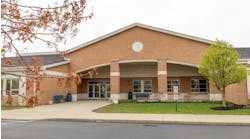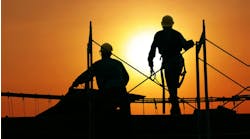John B. “Jack” Wilhelmi will take over as president of the Mechanical Contractors Association of America as the group's annual convention in March in Palm Springs, Calif.
MCAA elected Wilhelmi as president-elect during the association's 118th convention in Orlando, Fla., last year. Wilhelmi is president of the Omaha Division of Waldinger Corp., a mechanical contractor located in Omaha, Nebraska.
Appointed to the Board of Directors in 2001, Wilhelmi is active in the association on both the national and local levels. At the national level, he serves on the executive committee and the board of directors. He also serves on the strategic estimating conference task force, and as vice president of the Mechanical Contracting Education & Research Foundation's board of trustees. In addition, he served as chairman of the career development committee and as a member of the Advanced Leadership Institute committee.
At the local level, he is active in the MCA of Omaha, where he served three terms as president after having served as treasurer and vice president.
CONTRACTOR recently was able to ask Wilmelmi some questions about his background, his take on industry issues and his goals for the coming year.
QUESTION: When and why did you make the decision to get into the mechanical contracting industry?
ANSWER: I planned to be a mechanical contractor for as I long as I can remember. I worked for my father, a small mechanical contractor, during my elementary and high school years, and he taught me the business. After school I made pipe nipples from scrap pipe and at age 16 I supervised the rough-in of my first project, a small hospital. I also had the opportunity to help with estimates, which I found then and still find now the most exciting part of the business.
Q: What is the most difficult aspect of running the Omaha Division of The Waldinger Corp.?
A: The most difficult aspects are managing the shortage of people, both office and craft, and having the courage to make the tough and unpopular decisions.
Q: What are the advantages and disadvantages of working for a company that's as big and as spread out as Waldinger? (Waldinger is headquartered in Des Moines, Iowa, and has offices in seven states in the Midwest and Southeast)
A: The advantages are numerous, such as name recognition, financial strength, the ability to do any project and the sharing of resources and knowledge with other divisions. There's always someone to share ideas with and there are more experiences from which to learn. You are never an island.
Q: Is it more difficult to run a contracting firm now than when you got into the business?
A: Many of the problems are the same, such as finding and motivating skilled people and managing the project. Our movement to a litigious society has clearly increased our awareness of terms and conditions and the legal pitfalls. We have experienced incredible changes in technology. Some of these changes have made management easier while others have made our projects more demanding. For example, projects that just a few years ago were three years in length now are done in half the time. On the other hand, changes in the materials we use have made many of our projects simpler and less labor intensive.
As the education association, MCAA can and does play a key role in making sure its members have the tools and knowledge to adapt to these changes. An example is our upcoming Strategic Estimating Conference, which will focus on the process, future and advantages of estimating high performance buildings. This program is particularly important since it will provide our members with the opportunity to explore the latest intelligent take-off programs. By comparing traditional estimating methods with the latest automated design and building imaging programs, our members will gain an understanding of the time and cost savings that can be achieved — enhancing their value in the design process.
Q: What do you love about your job?
A: Mentoring and motivating the young people in our industry and witnessing their success.
Q: What's the one task you wish you never had to do again?
A: Negotiating a labor contract in an adversarial environment. I agree wholeheartedly with [United Association] General President [Bill] Hite that labor/management cooperation is the key to our joint survival.
Q: What is the most important thing that you've learned in your years in the business?
A: Your word is your bond and once that trust is damaged it can never be completely repaired.
Q: What is the mechanical contracting industry's biggest challenge?
A: Finding the resources and skilled manpower necessary to satisfy the nation's construction appetite and to continue the movement to build highly efficient, sustainable buildings.
Q: What has been the impact of different methods of project delivery?
A: The changes in project delivery have allowed mechanical contractors to take more of a leadership role in the design and construction of many projects. Many of the new “green” designs are driven almost entirely by the mechanical design and many of our members are leading that effort. Project management has always been the management of the building process.
Q: Will the troubles in the housing market have an impact on the commercial/industrial/institutional market?
A: Yes, as homebuilders look to the commercial market for revenue, they will impact markets all the way up the ladder. Commercial contractors will start looking at larger projects and the ripple effect will be felt by all contractors. Markets may well become even more competitive.
Q: Outgoing MCAA President Dave Kruse has been an outspoken advocate of green and sustainable construction. Will you continue that?
A: Yes, one of my goals is for MCAA to continue to promote sustainable and green construction. This movement is clearly the right thing to do and will benefit our great country in many ways. MCAA will host at least four preparation classes for the LEED Accredited Professional exam in 2008.
Instead of a Green Opportunities conference this year, we are inaugurating a series of Webinars on our www.greencontractors.us web site that will help our members add to their knowledge base on advanced green topics. The topics include marketing, new technologies, retro-commissioning, water efficiency products and design, lifecycle costing, and a particular interest of mine - estimating.
Q: At what point in your career did you decide to become an officer of MCAA and why?
A: I decided to volunteer as an officer of MCAA because we all have a duty to give back to the industry that has supported us and our families. Tom Koehn, Waldinger's chief executive officer, once said, “Many of the management processes we use came from MCAA.” If we do not continue to grow and support MCAA we will quickly fall behind our competition. I was an active volunteer fireman for over 30 years, so volunteering is not new to me. MCAA became my “Fire Department” when I retired from the fire service.
Q: Do you have a list of goals for your presidency?
A: To continue the work of my predecessors in the following key areas:
Market recovery with UA General President Bill Hite and his membership.
Promote sustainable construction and green technologies through the education of MCAA members.
Recruiting and career development through the expansion of our Student Chapter program.
Education of MCAA members in the areas of quickly advancing technology, BIM, automated estimating, CAD and automated prefabrication.

